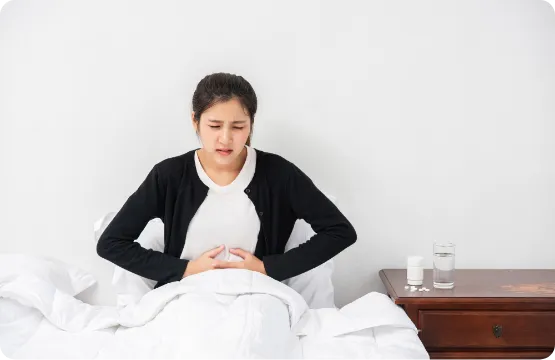Comprehensive Diarrhea Care
at Manhattan Medical Arts
Diarrhea is a sickness that is well-known around the world and affects both the young and old.
It can be defined as loose or watery stool that may cause an individual a minor discomfort in their everyday life or a severe sickness condition. So, there must be known the causes, signs, and measures which in turn can help in the management
and prevention of depression.
What Is Diarrhea?
Diarrhea can be categorized into two main types:
Acute Diarrhea
This type may only last for a few days and it is mainly triggered by infections, poor diet, or other aching conditions.
Chronic Diarrhea
Chronic diarrhea which can last for more than four weeks may be caused by conditions such as irritable bowel syndrome (IBS) or inflammatory bowel disease (IBD).
What Causes Diarrhea?
There are different causes of diarrhea such as infections, what an individual eats, and other diseases and conditions.
Common causes include:
Bacterial Infections
E. coli, Salmonella, Shigella, Campylobacter, and others cause food and waterborne illness among humans and cause acute diarrhea. Some of the signs may comprise abdominal pain, including a high temperature and diarrhea.
Viral Infections
Some of the common viruses that may lead to acute diarrhea include the following; norovirus, rotavirus, and adenovirus. As for rotavirus, it causes severe diarrhea mostly in children, and as for norovirus, it causes gastroenteritis mostly in adults and it is frequent in groups of people.
Parasitic Infections
Diarrheal diseases are associated with protozoan parasites such as Giardia lamblia and Entamoebahistolytica. These infections are normally a result of consuming impure water and lack of good hygiene.
Irritable Bowel Syndrome (IBS)
IBS is a chronic gut disorder that targets the large intestine and is characterized by bouts of diarrhea, stomach ache,
and gas.
Dietary Triggers
Stimulants of diarrhea include Spicy foods, Fried foods, and Dairy products, particularly in individuals who are allergic to lactose, Sorbitol, and caffeine.
Travelers’ Diarrhea
Ingestion of contaminated food and water while on the move mostly in developing nations experiencing poor hygiene can cause travelers’ diarrhea which is characterized by abdominal pain and nausea.
Symptoms Of Diarrhea
Diarrhea can therefore be accompanied by a wide range of symptoms dependent on the cause of the diarrhea
and its seriousness. Common symptoms include:

Frequent, Loose, or
Watery Stools
It is the first and only signal that the body will give out to show that it is affected by the flu.

Abdominal Pain and
Cramping
Continuing from a slight inconvenience to tremendous pain.

Bloating and
Gas
Diarrhea is always accompanied by gas production and bloating in case of excessive production of the substance.

Nausea and
Vomiting
A few people may develop these signs.

Dehydration
Some of the signs include; dryness of the mouth, increase in the production of saliva, deep thirst, and decreased formation of urine.

Fever
A low-grade fever if the diarrhea is due to infection.
Diarrhea Treatment
The management of the diarrhea includes oral rehydration, alteration of diet, and the use of anti-diarrhea agents. General
treatment approaches include:
Hydration
During diarrhea, it is equally important to replenish fluids
that one has lost through increased urination. Oral rehydration solutions containing electrolytes are very useful in these situations.
Dietary Adjustments
Opt for a clear liquid diet since foods that are likely to worsen diarrhea should be refused. The BRAT diet which includes bananas, rice, applesauce, and toast is suggested. Some foods are rather aggravating; these include dairy products, fatty foods, and foods high in fiber should be avoided until the condition subsides.
Medications
There are prescription medicines like loperamide that shall assist in the reduction of bowel movements with a view to minimizing the symptoms. Nonetheless, if diarrhea is a result of an infection, it should be taken sparingly and under the doctor’s recommendation.
Probiotics
These beneficial bacteria can help to effectively enhance the normal population of bacteria in the gastrointestinal tract, especially after antibiotic-associated diarrhea. The consumption of cultured yogurt or the intake of probiotics is very helpful.
Diagnosing Diarrhea
To diagnose diarrhea particularly when acute or chronic, several tests may be required:

Stool
Test
Diagnosis bacterial, viral, parasitic, and blood disorders.

Complete Blood
Count (CBC)
Used in diagnosing infections and swelling, and therefore offers general health status data.

Kidney
Function Test
Evaluates the effect of diarrhea on the kidney function.
When To See A Specialist
Most diarrhea cases that are not severe can be treated at home but in the following
circumstances you should seek a doctor:
Symptoms Persist
Diarrhea which lasts for more than two days in an adult or not more than 24 hours in a child.
Severe Symptoms
This would call for a doctor’s attention and it includes; High fever, Severe stomach pain, and Blood in the stool.
Manhattan Medical Arts
Your Trusted Healthcare Provider
Diarrhea can be caused by various factors and treated at our Manhattan Medical Arts multi-specialty clinic and primary care clinic situated at 492 6th Avenue, between 12th and 13th Streets, Greenwich Village, NYC 10011, and at 72-14 Austin St, Forest Hills. It has a team of experienced staff to effectively attend to patients’ needs to offer early relief to symptoms.
Despite the fact diarrhea is usually not serious, it has an impact on the quality of life and daily functioning. Thus, it becomes vital to familiarize its clinical presentation, risk factors, and management strategies to prevent and cope with the condition. Our specialized team is waiting to guarantee your tummy is in its very best shape.
Frequently Asked Questions
What causes Diarrhea?
Infections, food intolerances, drugs, and illnesses including IBS and IBD can all result in diarrhea.
How long does diarrhea last?
While chronic diarrhea might linger for weeks, acute diarrhea usually passes after a few days.
Why do I have Diarrhea?
Infections, food triggers, stress, and underlying medical issues can all cause diarrhea.
What is a traveler's Diarrhea?
When traveling, especially in places with inadequate sanitation, tainted food or water can lead to traveler’s diarrhea.
Why do we get Diarrhea?
Infections, food intolerances, digestive problems, or drug reactions can all cause diarrhea.
Why do I get diarrhea after Eating?
Allergies, digestive disorders such as IBS, and food intolerances can cause diarrhea after eating.
Can you get diarrhea from not Eating?
While being without food can aggravate the digestive tract, diarrhea is not usually brought on by it. However, sensitive people may experience problems as a result of fasting.
Can you get diarrhea from Dehydration?
Although dehydration isn’t the direct cause of diarrhea, it can exacerbate the illness by impairing intestinal function.
Latest Blog Posts
Making primary care accessible















